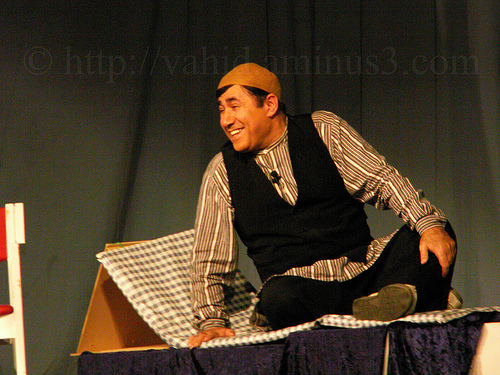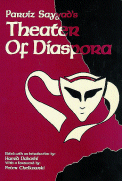Born in Lahijan in 1939, Parviz Sayyad was one of the leading actors and playwrights during his youth in Iran. In 1960, after the formation of Iran’s National Television, Sayyad and many others from theater joined its cast and started producing tele-theater shows until 1970. Sayyad and Apick Youssefian (who later with her daughter Mary Apick played in many of Sayyad’s films) were the leading characters of Iran’s first television series, “AMIR ARSALAN.” The show was quite successful and paved the road for Sayyad’s future career in cinema and television.
Theater of Diaspora

Parviz Sayad as Samad
The following year Sayyad joined Parviz Kardan in another successful TV series called “SARKAR OSTOVAR”. This is where his famous Samad character was first formed. Samad became so popular that in 1969 with the help of Ali Abbasi, Sayyad directed his first Film “Samad and the Flying Carpet” using the same character. At the same time he continued producing shows for Iran’s National Television. Some of the most famous ones were Octopus, and DEAR UNCLE NAPOLEON (Taghvaii 1977).
Out of his homeland, Iran, film critics began acknowledging Sayyad’s work when they saw his first film in exile, THE MISSION, made in 1984. He, however, had written and directed more than a dozen films and appeared in most of them as the lead actor, back home, where he used to be a household name prior to the Islamic Revolution.
International Film Guide (1977), described him as “An extraordinary popular and vital member of the Iranian film world”, while Film Comment Magazine wrote, “in much of Sayyad’s work, he examines the lives of individual people caught up in political or social events which are beyond their control. In DEAD END (1976), Mary Apick plays a lovesick girl wooed by an eligible young man, only to find her suitor a SAVAK agent whose mission is to arrest her brother. In Shahid Saless’ celebrated IN DER FREMDE (Far From Home) (1975), Sayyad plays the part of a lonely Turkish immigrant laborer in West Berlin who is met with indifference when he tries to make friends with his German neighbors.
Sayyad’s professional life is in fact full of paradox and contradictions. Before the Islamic Revolution, he was one of the leading figures in the IRANIAN popular cinema, specializing in the role of a country bumpkin baffled by the ways of the big city. In 1974, he co-founded The New Film Group, a loose confederation of New Wave filmmakers, and used the money from his commercial successes to help finance the works of young and talented directors who could hardly find any backing in the conventional movie market. One of the last films he made in Iran, DEAD END, has a double distinction; its star, Mary Apick, received the Best Actress Award at the 1977 Moscow Film Festival, but the film was never publicly shown in IRAN, while the Shah was in power. The former action undoubtedly influenced the latter. The Islamic Regime’s reaction towards this film was not any better, of course. Although it was the first successful film shown after the Revolution, in a few months it had to be canned for good. This time, the contents was not the issue, but that the leading characters appeared in public without the Islamic veil, Chador!
After making a film deal in Germany, when the Revolution broke out, Sayyad figured he would not be welcomed back after his Tehran Little Theater was taken over by an Islamic radical group. This led him to a tiny Greenwich Village apartment where he quietly worked towards his Ph.D. at the City University, while awaiting his family’s return to him from Iran; and so the making of a low budget thriller like film, THE MISSION, became possible. THE MISSION, described by David Denby of New York Magazine as “the first Gandhian Thriller”, concerns the political awakening of a young assassin (Houshang Touzie) sent by a Moslem radical group to eliminate a former government official. It was an official entry in The Berlin Film Festival, The London Film Festival, and won The Jury Grand Prize at The Locarno Film Festival (1983).
Inspite of THE MISSION’s overall success, it took Sayyad four years to finance his second film in exile, CHECKPOINT, with the help of his long time artistic collaborator, Mary Apick. Meanwhile they produced a play, entitle Khar (Donkey) which was based on a short piece that Sayyad had written.
Sayyad, now working in Los Angeles directing Farsi-language stage plays and TV shows for the large Iranian exile community there, says that all his movies – with the exception of one that depicts the lives of an old couple (the woman wears a chador throughout)- are banned in the Islamic Republic. “Under the Khomeini regime,” he declares, “it seems that any independent productions are immediately banned, except for propaganda films. They have a Ministry of Art and Culture that does produce films, but these hardly ever get shown. At least during the Shah’s period, a film like THE CYCLE, which was a great movie, could be made. [Sayyad was co-producer of the movie.] We’ve forgotten about that period, but when we compare it to the present regime, it was like living in paradise.”
(From Parviz Sayyad’s official website at www.parvizsayyad.com)



 Columbia University
Columbia University Aljazeera
Aljazeera Middle East Eye
Middle East Eye Springer Palgrave
Springer Palgrave